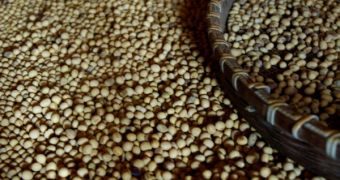The European Commission allowed for the imports of Monsanto's genetically-modified (GMO) soybean, known as MON 89788, or Roundup Rready2Yield, on the markets of all its 27 countries over the next decade, officials announced on Thursday. The products will not be grown for direct human use but, rather, will be used as high-quality animal feed and in some foods. The new soybeans will produce increased yields for farmers and will also be resistant to various pesticides, currently used in the EU.
The Union has numerous procedures in place, which are to be followed if a GMO company wants to have its products approved for growing or import. Monsanto, one of the most criticized companies in the world, due to its hard-line policy of only creating sterile seeds, which cannot be grown the season after they were planted, will be Europe's top new supplier.
Understandably, environmental groups and lobbyists expressed their deep dissatisfaction with the measure and said that there would be protests over the issue. Currently, the Union produces very little amounts of soybeans, way below its yearly needs. Most affected by the lack of good feed are animal growers and feed manufacturers, who say that introducing the new strand of soy will be like a breath of fresh air for them.
The biotech industry applauded the decision as well and took this opportunity to again complain about the fact that the rules set in place by the European Union are very complex, and that they take ages to meet. Officials inside the Union say that there is no chance these rules will be changed anytime soon, because their sole purpose is to offer environment authorities in the Union the possibility to track down and investigate any complaints about a company's products.
Over the past 3 years, the Commission approved several such GMOs on its markets, mostly maize, because of its own low productivity. But, objectively speaking, the rate of approval has been low, and the needs are not yet fully met, and probably won't be anytime soon, even with Monsanto's new strand.

 14 DAY TRIAL //
14 DAY TRIAL //